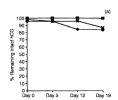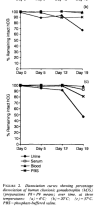Not in your standard analysis of what is sent to you, no.
The question here, it seems, is how these peptides could degrade in time "in real world use". And in that use, bacteriostatic saline or water is commonly used.
A good protocol might be, 5mg Semaglutide reconstituted with 2ml 0.9% Benzyl Alcohol in water, tested. Refrigerate (2-8c), test again at 7 days, 14, 30, 60.Compare. (And for control half the sample with ultrapure).
Have a spare sample you could run this for the community and your curiosity? I know some members that would donate a vial for the testing.



